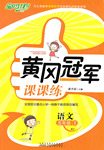题目内容
________ is quite natural, a beginner can't read the books written in English very quickly.
- A.Which
- B.As
- C.What
- D.It
本题是连词的使用考查。as引导非限制性定语从句,表示“正如……那样”的含义。

 黄冈冠军课课练系列答案
黄冈冠军课课练系列答案完形填空(共20小题;每小题1分,满分20分)
阅读下面短文,掌握其大意,然后从各题所给的四个选项中,选出最佳选项 。
Water and its importance to human life were the centre of the world’s attention last week. March 22 was World Water Day and 36 the theme “Water for Life”.
There are more than one billion people in the world who live without 37 drinking water. The United Nations 38 to cut this number in half by 2015.
Solving such a big problem seems like a(n) 39 challenge. But everyone, 40 teenagers, can do something to help. A teenage girl in the US has set an example to the 41 of her age around the world.
Rene Haggerty, 13, was awarded the 2004 Gloria Barron Prize for her work— 42 discarded(废弃的) batteries(电池)which pollute water.
In 2003, Haggerty went on a field trip to the Great Lakes Science Centre in Ohio. There she saw an exhibit about how 43 in old batteries harm the water of Lake Erie.
Haggerty learnt that 44 the batteries was an easy solution. “I think everybody can do it, because everyone 45 batteries, and it can make a big difference.” With these words, she began to 46 awareness in her area.
She 47 her county government and school board. She got permission to start a recycling programme in schools 48 the public library, hospital, and churches. With help from her family, friends and local waste-management 49 , she gathered containers, arranged transportation, and made a(n) 50 video.
Over the past two years, she collected four tons of batteries and drew the attention of officials, who were in charge of a battery recycling programme but had made 51 progress.
When asked 52 she feels like a hero, Haggerty is quite ____53 . “Not really. Well, maybe for the fish I saved!”
Every year the Gloria Barron Prize 54 young Americans aged 8 to 18 who have shown leadership and courage in 55 the public and the planet. Each year ten winners receive US $ 2,000 each, to help with their education costs or their public service work.
| 【小题1】 |
|
| 【小题2】 |
|
| 【小题3】 |
|
| 【小题4】 |
|
| 【小题5】 |
|
| 【小题6】 |
|
| 【小题7】 |
|
| 【小题8】 |
|
| 【小题9】 |
|
| 【小题10】 |
|
| 【小题11】 |
|
| 【小题12】 |
|
| 【小题13】 |
|
| 【小题14】 |
|
| 【小题15】 |
|
| 【小题16】 |
|
| 【小题17】 |
|
| 【小题18】 |
|
| 【小题19】 |
|
| 【小题20】 |
|
We were driving along the village of Simdara. I 36 to my right and saw an old shelter 20 meters from the side of the road that appeared to be filled with 37 .
“Would you mind 38 ?” I asked the driver Waris. “I think there is a(n) 39 .”
Waris laughed. “No, Greg, that’s actually a public toilet,” explained Waris and he kept 40 .
“But why are there so many kids? What are they doing there? We need to 41 ,” I insisted. The word caught Waris 42 and he stopped the car.
When we reached the shelter, to my surprise, it was 43 a toilet—or at least it had been at one time. The roof was gone now, and the four toilet pits (坑) had been 44 with old boards. There were 25 children between 4 and 5 years old, one 45 , and a wooden board against the wall.
Though having a tough learning environment, the students are quite 46 to chat with us about their class and curriculum (课程). After about ten minutes, the teacher 47 if we might like to see “the rest of the school”. We 48 and followed her up the hill.
Just over the top of the hill, there was an old tent. It was very 49 inside because nearly 100 students were packed like sardines (沙丁鱼). These students were a little 50 , fourth-, and sixth-graders, and all of them were sitting on the ground. 51 the teacher, they were doing extremely well — 52 most of them had no books, paper or even pencils.
We were forced to 53 to catch our plane. We were all 54 and decided to collect money to build a school for these children who had a hunger for 55 .
| 【小题1】 |
|
| 【小题2】 |
|
| 【小题3】 |
|
| 【小题4】 |
|
| 【小题5】 |
|
| 【小题6】 |
|
| 【小题7】 |
|
| 【小题8】 |
|
| 【小题9】 |
|
| 【小题10】 |
|
| 【小题11】 |
|
| 【小题12】 |
|
| 【小题13】 |
|
| 【小题14】 |
|
| 【小题15】 |
|
| 【小题16】 |
|
| 【小题17】 |
|
| 【小题18】 |
|
| 【小题19】 |
|
| 【小题20】 |
|